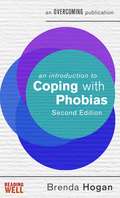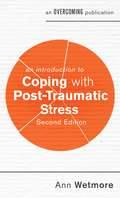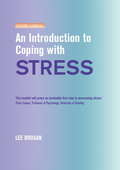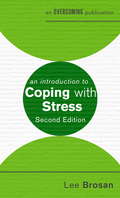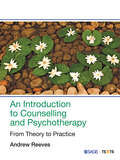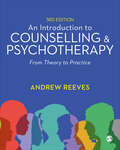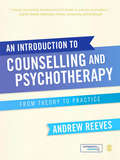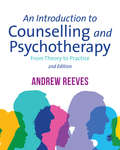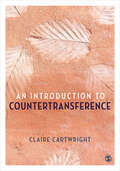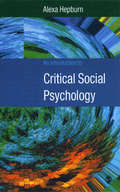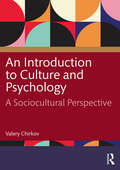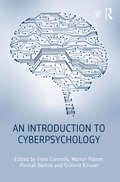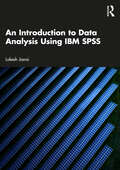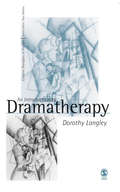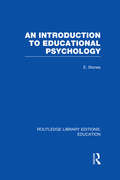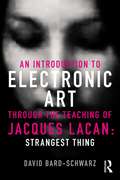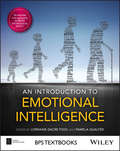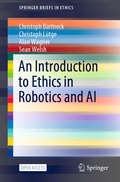- Table View
- List View
An Introduction to Coping with Phobias, 2nd Edition (An Introduction to Coping series)
by Brenda HoganLearn how to overcome your phobiasIt is very common for people to have a phobia of something - heights, spiders, water... but when that fear prevents you from doing the things you enjoy doing in life, or causes you deep anxiety and feelings of panic, it is time to seek help.This self-help guide explains how phobias develop and what keeps them going. This updated edition gives you clinically proven cognitive behavioural therapy (CBT) techniques to help you challenge the way you think and behave:· Setting goals and starting to face your fears· Avoiding relapses and problem-solving
An Introduction to Coping with Phobias, 2nd Edition: A Books on Prescription Title
by Brenda HoganOvercoming app now available via iTunes and the Google Play Store.Learn how to overcome your phobiasIt is very common for people to have a phobia of something - heights, spiders, water... but when that fear prevents you from doing the things you enjoy doing in life, or causes you deep anxiety and feelings of panic, it is time to seek help.This self-help guide explains how phobias develop and what keeps them going. This updated edition gives you clinically proven cognitive behavioural therapy (CBT) techniques to help you challenge the way you think and behave:· Setting goals and starting to face your fears· Avoiding relapses and problem-solving
An Introduction to Coping with Post-Traumatic Stress, 2nd Edition (An Introduction to Coping series)
by Ann WetmoreTraumatic stress arises in reaction to catastrophic life events. Such events can range from train disasters and car crashes to natural calamities such as earthquakes, wildfires and floods, and from life-threatening medical diagnoses to acts of violence and abuse. Post-Traumatic Stress Disorder (PTSD) is a common psychological condition resulting from such events and occurs when our coping resources have been completely overwhelmed. The intrusive hyper-reactions, recurring memories, flashbacks, avoidance behaviours and changes in the sense of self linger long past the actual event and often prevent a sense of healing or resolution with the experience. This self-help guide uses Cognitive Behavioural Therapy (CBT) strategies with a trauma focus to help you to manage your reactions to the traumatic experience and find new, effective ways of coping. You will learn:- To understand your reactions to traumatic events - Practical strategies for monitoring, managing and overcoming post-traumatic stress - Innovative therapeutic options and new mobile device supports
An Introduction to Coping with Post-Traumatic Stress, 2nd Edition (An\introduction To Coping Ser.)
by Ann WetmoreTraumatic stress arises in reaction to catastrophic life events. Such events can range from train disasters and car crashes to natural calamities such as earthquakes, wildfires and floods, and from life-threatening medical diagnoses to acts of violence and abuse. Post-Traumatic Stress Disorder (PTSD) is a common psychological condition resulting from such events and occurs when our coping resources have been completely overwhelmed. The intrusive hyper-reactions, recurring memories, flashbacks, avoidance behaviours and changes in the sense of self linger long past the actual event and often prevent a sense of healing or resolution with the experience. This self-help guide uses Cognitive Behavioural Therapy (CBT) strategies with a trauma focus to help you to manage your reactions to the traumatic experience and find new, effective ways of coping. You will learn:- To understand your reactions to traumatic events - Practical strategies for monitoring, managing and overcoming post-traumatic stress - Innovative therapeutic options and new mobile device supports
An Introduction to Coping with Stress
by Leonora BrosanOvercoming app now available.This is a new addition to the popular 'Introduction to Coping with' series of self-help booklets. Written by the author of the popular self-help title Overcoming Stress, An Introduction to Coping with Stress offers a first step in CBT-based self-help. We all know what stress feels like, and indeed what it feels like when we have too much stress in our lives. Too much stress can have a negative impact on us, almost without our noticing it. It can affect our family life, friendships and other relationships, our work life and our physical and emotional wellbeing. This self-help guide uses CBT strategies to help the reader to recognise what happens to us when we are under stress and how we can change how we feel, think and act in order to regain a more balanced outlook on life and manage it more effectively. This practical booklet is also an ideal resource for health professionals and carers.
An Introduction to Coping with Stress (An Introduction To Coping Ser.)
by Lee BrosanA revised and updated edition in the popular 'Introduction to Coping with' series of self-help books. Written by the author of the popular self-help title Overcoming Stress, An Introduction to Coping with Stress 2nd Edition offers a first step in self-help, using techniques from cognitive behavioural therapy (CBT). We all know what stress feels like, and indeed what it feels like when we have too much stress in our lives. Too much stress can have a negative impact on us, almost without our noticing it. It can affect our family life, friendships and other relationships, our work life and our physical and emotional wellbeing. This self-help guide uses CBT strategies to help the reader to recognise what happens to us when we are under stress and how we can change how we feel, think and act in order to regain a more balanced outlook on life and manage it more effectively. This practical booklet is also an ideal resource for health professionals and carers.
An Introduction to Coping with Stress, 2nd Edition (An Introduction to Coping series)
by Leonora BrosanA revised and updated edition in the popular 'Introduction to Coping with' series of self-help books. Written by the author of the popular self-help title Overcoming Stress, An Introduction to Coping with Stress 2nd Edition offers a first step in self-help, using techniques from cognitive behavioural therapy (CBT). We all know what stress feels like, and indeed what it feels like when we have too much stress in our lives. Too much stress can have a negative impact on us, almost without our noticing it. It can affect our family life, friendships and other relationships, our work life and our physical and emotional wellbeing. This self-help guide uses CBT strategies to help the reader to recognise what happens to us when we are under stress and how we can change how we feel, think and act in order to regain a more balanced outlook on life and manage it more effectively. This practical booklet is also an ideal resource for health professionals and carers.
An Introduction to Counselling and Psychotherapy: From Theory to Practice
by Andrew ReevesThis book provides an authoritative introduction to everything one needs to know to become a professional therapist. An Introduction to Counselling and Psychotherapy takes readers through the entire therapeutic process by introducing the theory and applying it to real-life practice. Drawing on years of experience as a counselling practitioner and researcher, the author links counselling and psychotherapy theory to the development of appropriate skills, and locates it within the context of contemporary therapeutic practices. This ground-breaking textbook represents a benchmark in understanding and applying the principles and practice of counselling and psychotherapy. Key Features: • Chapter Overviews and Section Outlines help readers navigate the book and get the most out of it. • Discussion Questions and Pause for Reflection sections help readers critically engage with and reflect on what they have learnt. • Case Studies help readers apply key ideas in practice across settings and modalities. • Companion website features a wealth of chapter-by-chapter resources for both students and lecturers.
An Introduction to Counselling and Psychotherapy: From Theory to Practice
by Andrew ReevesThis latest edition introduces you to the fundamentals of counselling and psychotherapy, accompanied by fresh research, perspectives and case-studies - ensuring comprehensive and up-to-date coverage of the context, theories, skills and practice of counselling professions. This book also covers the latest developments in the world of counselling and psychotherapy, including: -Online counselling and psychotherapy -Social justice approaches and the political positioning of therapy -Updated content and reading lists addressing diversity, inclusivity and decolonisation. The Introduction is designed to support and expand your learning and development, with features such as discussion questions, prompts for reflection, case examples and further reading. Beyond the pages of the book, there is a complementary set of extensive online resources, including further case studies, journal articles and videos. From newly enrolled to starting your practice placement, this book is the perfect companion for your counselling training, and beyond.
An Introduction to Counselling and Psychotherapy: From Theory to Practice
by Andrew ReevesThis latest edition introduces you to the fundamentals of counselling and psychotherapy, accompanied by fresh research, perspectives and case-studies - ensuring comprehensive and up-to-date coverage of the context, theories, skills and practice of counselling professions. This book also covers the latest developments in the world of counselling and psychotherapy, including: -Online counselling and psychotherapy -Social justice approaches and the political positioning of therapy -Updated content and reading lists addressing diversity, inclusivity and decolonisation. The Introduction is designed to support and expand your learning and development, with features such as discussion questions, prompts for reflection, case examples and further reading. Beyond the pages of the book, there is a complementary set of extensive online resources, including further case studies, journal articles and videos. From newly enrolled to starting your practice placement, this book is the perfect companion for your counselling training, and beyond.
An Introduction to Counselling and Psychotherapy: From Theory to Practice
by Dr Andrew ReevesThis book is an authoritative introduction to everything you need to know to become a professional therapist. It takes you through the entire therapeutic process, introducing the theory and applying it to real-life practice. Drawing on years of experience as a counselling practitioner and researcher, Andrew Reeves links counselling and psychotherapy theory to the development of appropriate skills, and locates it within the context of therapeutic practice today. Engagingly and accessibly written, the book is packed with learning features including Chapter Overviews, Summaries and a Glossary -helping you navigate the book and get the most out of it. Discussion Points, 'Skills Practice' and 'Pause for Reflection' sections, helping you critically engage with and reflect on what you have learned. Case Studies and scenarios, helping you apply key ideas in practice across settings and modalities. Indicated Further Reading and Important Websites - supporting your continued learning. This groundbreaking textbook represents a benchmark in understanding - and applying - the principles and practice of counselling and psychotherapy. It's accompanied by a companion website featuring a wealth of chapter-by-chapter resources for both students and lecturers to use alongside the book. From extended case studies through to web resources, links and PowerPoint presentations, these extra resources will help aid and enhance your learning and understanding. Andrew Reeves is a counsellor at the University of Liverpool and Editor of Counselling and Psychotherapy Research journal.
An Introduction to Counselling and Psychotherapy: From Theory to Practice
by Dr Andrew ReevesThis book introduces readers to everything they need to know about counselling and psychotherapy theory, skills and practice. Drawing on years of experience as a counselling practitioner and educator, Andrew Reeves links theory to the development of appropriate skills and locates it within the context of therapeutic practice. Features including chapter summaries, discussion questions, prompts for reflection, case examples and further reading help students to apply what they've learnt and give them the confidence to progress into practice. The book covers: key theoretical approaches personal development counselling skills professional settings law, policy, values and ethics working with difference and diversity client and present issues, and more Learning is also supported by a wealth of online resources such as case studies and videos that show what theory looks like in practice, as well as journal articles to help extend knowledge. This is the essential text for any trainee practitioner, or for anyone needing an introduction to the foundations of counselling theory and practice.
An Introduction to Counselling and Psychotherapy: From Theory to Practice
by Dr Andrew ReevesThis book introduces readers to everything they need to know about counselling and psychotherapy theory, skills and practice. Drawing on years of experience as a counselling practitioner and educator, Andrew Reeves links theory to the development of appropriate skills and locates it within the context of therapeutic practice. Features including chapter summaries, discussion questions, prompts for reflection, case examples and further reading help students to apply what they've learnt and give them the confidence to progress into practice. The book covers: key theoretical approaches personal development counselling skills professional settings law, policy, values and ethics working with difference and diversity client and present issues, and more Learning is also supported by a wealth of online resources such as case studies and videos that show what theory looks like in practice, as well as journal articles to help extend knowledge. This is the essential text for any trainee practitioner, or for anyone needing an introduction to the foundations of counselling theory and practice.
An Introduction to Countertransference
by Claire CartwrightThis introduction to countertransference in counselling and psychotherapy covers: Countertransference and the therapeutic relationship Different theoretical perspectives and approaches to countertransference and key psychodynamic perspectives (Freud, object relations, attachment, relational psychodynamic) and perspectives from other modalities (TA, integrative, CBT). How to understand and work with countertransference in practice (providing step-by-step guidance on identifying, understanding, and managing / processing countertransference.) The development and repair of therapeutic ruptures in the alliance Cultural countertransference. Written for trainees and practitioners from a range of psychotherapeutic approaches, this book is supported by reflective practice activities, research, case studies, chapter summaries and chapter summaries. It will help you enhance your knowledge and practice in relation to countertransference.
An Introduction to Countertransference
by Claire CartwrightThis introduction to countertransference in counselling and psychotherapy covers: Countertransference and the therapeutic relationship Different theoretical perspectives and approaches to countertransference and key psychodynamic perspectives (Freud, object relations, attachment, relational psychodynamic) and perspectives from other modalities (TA, integrative, CBT). How to understand and work with countertransference in practice (providing step-by-step guidance on identifying, understanding, and managing / processing countertransference.) The development and repair of therapeutic ruptures in the alliance Cultural countertransference. Written for trainees and practitioners from a range of psychotherapeutic approaches, this book is supported by reflective practice activities, research, case studies, chapter summaries and chapter summaries. It will help you enhance your knowledge and practice in relation to countertransference.
An Introduction to Critical Social Psychology
by Dr Alexa Hepburn'this book provides an excellent introduction to contemporary Critical Social Psychology, which anyone exploring the field would do well to read.' - Psychology in Society 'a very accessible introduction... lively and engaging.... Discussion questions are uncharacteristicaly thought-provoking, while practical exercises also seem better considered than one comes to expect from similar primers, suggesting a successful future as a core text in social psychology courses' - The Psychologist 'Erudition, sagacity, patience and scholarship radiate from this book. This is an excellent introduction to the various strands of critical thinking to emanate primarily from England, and, to some extent, from continental Europe. Anyone interested in learning more about the discursive side of critical psychology will find in this book an excellent guide. I recommend this book to all psychologists interested in critical perspectives' - Journal of Community and Applied Psychology A critical approach depends on a range of often-implicit theories of society, knowledge, as well as the subject. This book shows the crucial role of these theories for directing critique at different parts of society, suggesting alternative ways of doing research, and effecting social change. It includes chapters from the perspectives of social cognition, Marxism, psychoanalysis, discourse and rhetoric, feminism, subjectivity and postmodernism. In each case, the strengths and weaknesses of each perspective are highlighted, the ideas are linked to real world issues by a range of practical exercises, and guidance is given to further reading.These chapters will cover the work of diverse thinkers from within social psychology, such as Billig, Gergen, Kitzinger, Parker, Potter, Shotter, Walkerdine and Wetherell, and from outside, such as Butler, Derrida, Foucault, Haraway, Lyotard, Marx and Rose. An Introduction to Critical Social Psychology provides a systematic, integrated and accessible introduction to social psychology as a critical discipline. Consequently, it will be key reading for undergraduates and postgraduates studying Critical Social Psychology, and useful additional reading for postgraduates studying theoretical psychology and qualitative methods.
An Introduction to Culture and Psychology: A Sociocultural Perspective
by Valery ChirkovThe book offers an innovative introduction to culture and psychology, taking a sociocultural perspective to understand the complexities of culture-mind-behaviour interactions.In this book, the author emphasizes the dynamic relationship of the culture and the mind, outlining how organized sociocultural models regulate actions and practices across different domains of people’s lives, such as parenting, education, communication, and acculturation. Each chapter features chapter synopsis, boxed examples, a glossary of key terms, reflective questions, and recommended reading to help students engage further with the material. The book includes a range of cross-cultural case study examples and discussions which offer insights into the connections between culture, human psyche, and behaviour.An Introduction to Culture and Psychology is essential reading for undergraduate students taking culture and psychology courses. It can also be of interest to students and young scholars of psychology, anthropology, sociology, communication, and other related disciplines.
An Introduction to Cyberpsychology
by Irene Connolly, Palmer Marion, Barton Hannah and Kirwan GráinneAn Introduction to Cyberpsychology is the first book to provide a student-oriented introduction to this rapidly growing and increasingly studied topic. It is designed to encourage students to critically evaluate the psychology of online interactions, and to develop appropriate research methodologies to complete their own work in this field. The book is comprised of four main sections: An overview of cyberpsychology and online research methodologies Social psychology in an online context The practical applications of cyberpsychology The psychological aspects of other technologies. Each chapter includes: Explanations of key terms and a glossary to facilitate understanding Content summaries to aid student learning Activity boxes, discussion questions and recommended reading to guide further study. Further resources for students and instructors are available on the book’s companion website, including audio and video links, essay questions, a multiple-choice test bank, and PowerPoint lecture slides. Uniquely combining a survey of the field with a focus on the applied areas of psychology, the book is designed to be a core text for undergraduate modules in cyberpsychology and the psychology of the internet, and a primer for students of postgraduate programs in cyberpsychology.
An Introduction to Cyberpsychology (BPS Core Textbooks Series)
by Gráinne Kirwan, Irene Connolly, Hannah Barton, and Marion PalmerAn Introduction to Cyberpsychology provides a comprehensive introduction to this rapidly growing discipline. Fully updated in its second edition, the book encourages students to critically evaluate the psychology of online interactions and to develop appropriate research methodologies to complete their own work in this field.The book examines cyberpsychology and online research methodologies, social psychology in an online context, practical applications of cyberpsychology, and the psychological aspects of other technologies. This new edition has been carefully updated to include additional coverage of: Expanded content relating to major developments in the field and new content on gaming and screentime A new chapter examining the relationship between older adults and technology Cyberpsychology in focus feature boxes in each chapter that examine topics in depth Interviews with professionals working in fields relating to cyberpsychology Each chapter includes key terms and a glossary, content summaries, discussion questions, and recommended reading to guide further study.Supported by extensive online resources for students and instructors, this authoritative book is an essential core text for undergraduate modules in cyberpsychology, and an ideal primer for students of postgraduate programs in cyberpsychology.To view the additional student and instructor resources for this book, please visit bpscoretextbooks.routledge.com
An Introduction to Data Analysis Using IBM SPSS
by Lokesh JasraiThis textbook elaborates on the basic understanding and application of statistical tests and data analysis using hypothetical datasets and SPSS version 22.0. It presents step-by-step processes and to-the-point interpretation for quick assimilation and comprehension.Data Analysis Using SPSS Begins with the stages of data entry and goes on till editing and data visualization. Takes the readers through descriptive statistics, frequency, univariate, bivariate and regression analysis, cross-tabulation, linear models and non-parametric test procedures. Presents information through dialog boxes and tabular charts, and also incorporates important formulae, calculations and illustrations of sample data for an in-depth understanding of concepts and results. Can be used as a textbook as well as a reference book as it helps to build conceptual understanding, gaining software skills, and communicates data and its insights to accomplish research assignments, research/capstone projects and PhD research work. With comprehensive coverage, this book would be useful to the students, researchers and teachers of the various social sciences disciplines like Psychology, Sociology, Education, Social Work, Agriculture Management and other allied subjects. It would also be an invaluable companion to professionals and data scientists working in the field of analytics.
An Introduction to Dramatherapy (Creative Therapies in Practice series)
by Ms Dorothy Langley`The book is well researched and provides a solid overview' - Therapy Today `Dorothy Langley's book offers a valuable overview of dramatherapy in all its applications. It provides evidence of many years' work as a teacher and practitioner. It is both clear and readable, and will serve as a useful introduction to this unique therapeutic approach for people in other healing professions, particularly psychiatry, as well as for the general reader' - Roger Grainger, Senior Practitioner on the Register of Psychologists Specialising in Psychotherapy, and State Registered Arts Therapist, Drama An Introduction to Dramatherapy is a concise introduction to the background, theory and practice of a method of therapy which uses the dramatic process to help people during times of stress, emotional upheaval, illness or disability. Illustrated throughout with vivid examples from dramatherapy sessions, the book shows how drama can be used in an intentional and directional way to achieve constructive change with individuals or groups. In particular, the book highlights the power of drama as a therapeutic medium because of its foundations in metaphor, power which can be harnessed through the use of techniques such as role play, enactment, story-telling and the use of puppets and masks. An Introduction to Dramatherapy provides a welcome overview for readers who are new to the field and an excellent starting point for further study.
An Introduction to Educational Psychology (Routledge Library Editions: Education)
by Edgar StonesThis book introduces students of education to the elements of educational psychology. It also relates as closely as possible the findings of research to classroom practice. In order to make clear the fundamental processes involved in psychological development, the book starts with a study of the way in which the young child adapts its behaviour to its environment. This study considers some of the key aspects of physical development, mainly the central nervous system. At the same time the way physical growth and psychological development are influenced by the experience of the individual is also discussed. This discussion of development is followed by an examination of the processes of learning, with particular attention paid to the works of Piaget. The salient points of each chapter are brought together in a summary which may be used by the reader to obtain a preliminary overview of the content of the chapter, and as an aid to revision.
An Introduction to Electronic Art Through the Teaching of Jacques Lacan: Strangest Thing
by David Bard-SchwarzElectronic art offers endless opportunities for reflection and interpretation. Works can be interactive or entirely autonomous and the viewer's perception and reaction to them may be challenged by constantly transforming images. Whether the transformations are a product of the appearances or actions of a viewer in an installation space, or a product of a self-contained computer program, is a source of constant fascination. Some viewers may feel strange or unnerved by a work, while others may feel welcoming, humorous, and playful emotions. The art may also provoke a critical response to social, aesthetic, and political aspects of early twenty-first-century life. This book approaches electronic art through the teachings of Jacques Lacan, whose return to Freud has exerted a powerful and wide-ranging influence on psychoanalysis and critical theory in the twentieth century. David Bard-Schwarz draws on his experience with Lacanian psychoanalysis, music, and interactive and traditional arts in order to address aspects of the works the viewer may find difficult to understand. Dividing his approach over four thematic chapters—Bodies, Voices, Eyes, and Signifiers—Bard-Schwarz explores the links between works of new media and psychoanalysis (how we process what we see, hear, touch, imagine, and remember). This is a fascinating book for new media artists and critics, museum curators, psychologists, students in the fine arts, and those who are interested in digital technology and contemporary culture.
An Introduction to Emotional Intelligence (BPS Textbooks in Psychology)
by Lorraine Dacre Pool Pamela QualterBridges the gap between the scholarly literature and “pop-psych” books on EI Emotional Intelligence (EI) has become a topic of vast and growing interest worldwide and is concerned with the ways in which we perceive, identify, understand, and manage emotions. It is an aspect of individual difference that can impact a number of important outcomes throughout a person’s lifespan. Yet, until now there were no authoritative books that bridge the gap between scholarly articles on the subject, often published in obscure professional journals, and the kind of books found in the “pop-psych” sections of most large bookstores. This book fills that gap, addressing the key issues from birth through to old age, including the impact of EI on child development, social relationships, the workplace, and health. It is a useful introduction to the academic study of EI, including its history as a concept. Featuring contributions by an international team of EI researchers, this thought provoking and informative book offers students, educators, mental health professionals, and general readers a comprehensive, critical, and accessible introduction to state-of-the-art EI theory and research. From the historical origins of EI to its contemporary applications across an array of domains, An Introduction to Emotional Intelligence explores what the research evidence tells us about it, why it is important, and how it is measured. Throughout each chapter any potentially tricky words or concepts are highlighted and explained. And, most chapters feature activities to spur further reflection on the subject matter covered as well as ideas on how to apply aspects of EI to various questions or problems arising in the readers’ lives. Features contributions from expert authors from around the world with experience of researching and teaching EI theory and practice Makes EI concepts, foundations, research, and theory accessible to a wider audience of readers than ever before Explores EI’s roots in psychological thinking dating back to early 20th century and considers the reasons for its widespread popularity in contemporary times Reviews the latest research into the constructs of ability EI and trait EI and their validity in relation to health, wellbeing, social relationships, academic, and work performance An Introduction to Emotional Intelligence is fascinating and informative reading and a source of practical insight for students of psychology, management and leadership, education, social work and healthcare, and those working in education, health settings and in psychological counseling professions.
An Introduction to Ethics in Robotics and AI (SpringerBriefs in Ethics)
by Alan Wagner Christoph Lütge Sean Welsh Christoph BartneckThis open access book introduces the reader to the foundations of AI and ethics. It discusses issues of trust, responsibility, liability, privacy and risk. It focuses on the interaction between people and the AI systems and Robotics they use. Designed to be accessible for a broad audience, reading this book does not require prerequisite technical, legal or philosophical expertise. Throughout, the authors use examples to illustrate the issues at hand and conclude the book with a discussion on the application areas of AI and Robotics, in particular autonomous vehicles, automatic weapon systems and biased algorithms. A list of questions and further readings is also included for students willing to explore the topic further.
